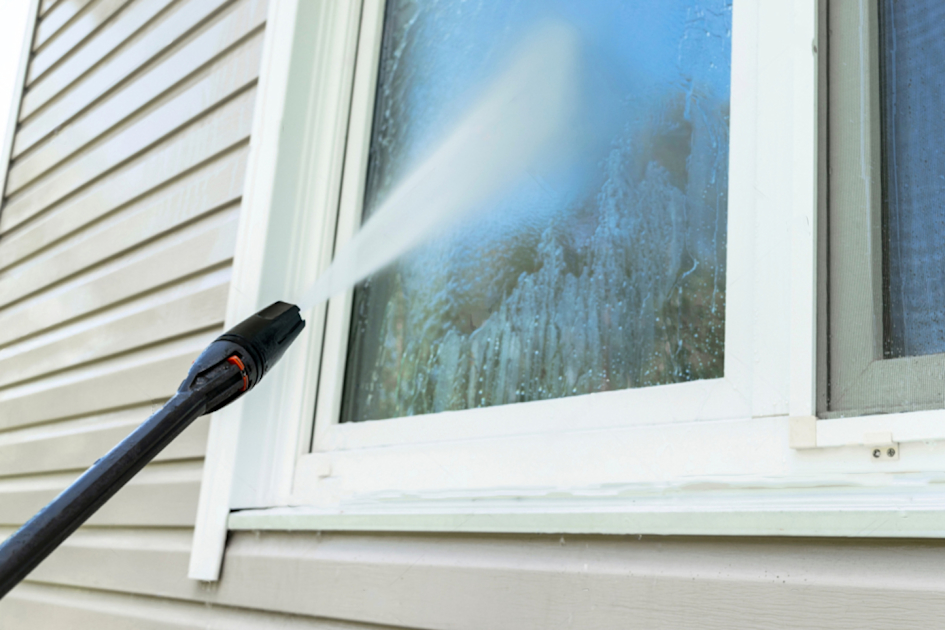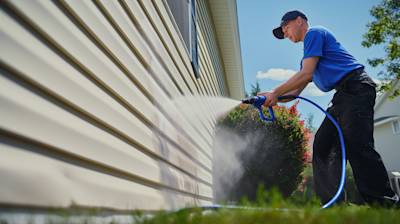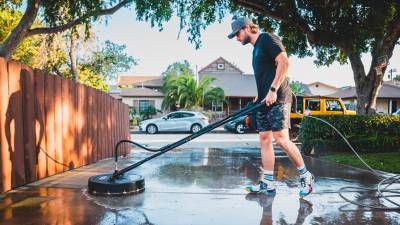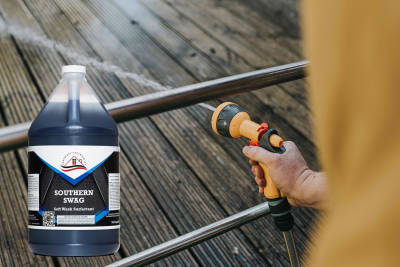Can You Pressure Wash Windows? Exploring the Dos and Don'ts
By Thomas


Share —
Introduction to Pressure Washing
Pressure washing, also known as power washing, is a cleaning technique that utilizes high-pressure water to blast away dirt, debris, and stains from surfaces such as sidewalks, driveways, decks, and even buildings. The process involves a specialized machine that propels water at varying levels of pressure, depending on the surface being cleaned.
It's a popular method for its efficiency in quickly and effectively cleaning large areas. The forceful water stream dislodges even the most stubborn grime, leaving surfaces looking fresh and renewed.
Benefits of Pressure Washing
Pressure washing offers numerous benefits, making it a preferred choice for many cleaning tasks. Some of the advantages include:
- Effective Dirt and Grime Removal: Pressure washing can tackle deeply embedded dirt and grime that traditional cleaning methods might struggle to eliminate.
- Time-Saving: With its high-pressure water stream, pressure washing can clean large areas in a fraction of the time it would take with manual scrubbing.
- Enhanced Curb Appeal: Pressure washing can instantly improve the appearance of your home or business, giving it a fresh and well-maintained look.
- Prepares Surfaces for Painting or Staining: Before painting or staining surfaces like decks or fences, pressure washing can help ensure a clean and smooth canvas for the new finish.
Risks of Pressure Washing Windows
While pressure washing is highly effective for many surfaces, it is not without its risks, especially when it comes to windows. The high water pressure can lead to several potential issues:
- Window Damage: Excessive water pressure can cause cracks, chips, or even shattered glass on windows, leading to costly repairs.
- Frame and Seal Damage: The force of the water can damage window frames and compromise the seals and caulking, leading to air leaks and reduced energy efficiency.
- Water Infiltration: If water seeps into the gaps and cracks around the window frame, it can lead to water damage inside the walls.
Suitable Window Types for Pressure Washing
Not all windows are created equal, and some can handle pressure washing better than others. Before attempting window pressure washing, consider the following:
- Tempered or Laminated Glass: These types of glass are more robust and can generally withstand pressure washing better than standard single-pane windows.
- Window Condition: If your windows are old, already cracked, or have any damage, pressure washing is not recommended.
- Historic or Delicate Windows: For historic or delicate windows, it's best to avoid pressure washing altogether and opt for gentler cleaning methods.
Safety Precautions for Pressure Washing Windows
When pressure washing windows, safety should always be a top priority. Follow these precautions to minimize the risk of accidents and damage:
- Wear Protective Gear: Use safety goggles, gloves, and appropriate footwear to protect yourself from potential debris and water splashes.
- Keep a Safe Distance: Maintain a safe distance between the pressure washer nozzle and the window to avoid causing damage.
- Use the Right Nozzle: Choose a nozzle with a wide spray angle to disperse the pressure evenly, reducing the risk of concentrated streams.
- Test on a Small Area: Before pressure washing an entire window, test a small, inconspicuous area to ensure there is no damage.
Alternative Window Cleaning Methods
If pressure washing is not suitable for your windows, don't worry; there are plenty of alternative methods that are safer and gentler:
- Hand Washing: The traditional method of using a squeegee, microfiber cloths, and eco-friendly cleaning solutions is still effective for many windows.
- Vinegar Solution: A mixture of water and vinegar is an excellent natural solution for cleaning windows without causing damage.
- DIY Cleaning Solutions: There are various DIY window cleaning solutions using ingredients like baking soda or lemon juice that are safe for your windows and the environment.
Step-by-Step Guide for Pressure Washing Windows
For windows that can withstand pressure washing, follow these steps for a safe and effective cleaning process:
- Prepare the Area: Remove any obstacles, close windows and doors, and cover nearby plants and delicate surfaces.
- Read the Manual: Familiarize yourself with the pressure washer's user manual for specific instructions.
- Use Low to Medium Pressure: Adjust the pressure washer to a low or medium setting to reduce the risk of damage.
- Maintain a Safe Distance: Hold the nozzle at a distance of about 2 feet from the window surface.
- Even Strokes: Make smooth and even strokes, keeping the nozzle parallel to the window.
- Clean from Top to Bottom: Start from the top of the window and work your way down to prevent streaking.
- Rinse Thoroughly: Rinse the window thoroughly with clean water to remove any soap or debris.
- Dry the Window: Use a clean, lint-free cloth to dry the window and prevent water spots.
Hiring Professionals for Window Pressure Washing
When in doubt about pressure washing your windows, or if you have delicate or hard-to-reach windows, it's best to hire professional window cleaning services. Professional pressure washers, like Grime Busters, have the expertise and equipment to clean your windows safely and efficiently, leaving them spotless and damage-free.
Maintenance Tips After Pressure Washing
After pressure washing your windows, follow these maintenance tips to keep them in excellent condition:
- Inspect for Damage: Regularly inspect your windows for any signs of damage, cracks, or water infiltration. Address any issues promptly to prevent further damage.
- Seal and Caulk: If you notice any gaps or cracks around the window frames or seals, reseal or recaulk them to maintain energy efficiency and prevent water leaks.
- Keep Surrounding Areas Clean: Regularly clean the areas around your windows, such as gutters and eaves, to prevent debris from accumulating and causing damage.
- Consider Protective Coatings: Some windows can benefit from the application of protective coatings that repel water, dirt, and grime, making them easier to clean and maintain.
Environmental Impact of Pressure Washing
Pressure washing, like any cleaning method, can have environmental implications if not done responsibly. Here are some tips to minimize the environmental impact:
- Water Conservation: Use a pressure washer with adjustable pressure settings to avoid excessive water usage. Additionally, consider collecting and reusing rainwater for pressure washing tasks.
- Biodegradable Cleaning Solutions: Opt for biodegradable and eco-friendly cleaning solutions to minimize chemical runoff into the environment.
- Proper Disposal: Dispose of cleaning wastewater properly and according to local regulations to prevent contamination of water sources.
- Prevent Chemical Runoff: Avoid pressure washing near storm drains or water bodies to prevent chemicals from entering natural ecosystems.
Legal and Insurance Considerations
Before undertaking pressure washing on your property, consider the following legal and insurance aspects:
- Obtain Necessary Permits: In some areas, you may need a permit for pressure washing, especially for commercial properties.
- Check Insurance Coverage: Verify if your insurance policy covers any potential damage caused during pressure washing.
- Hire Insured Professionals: If hiring a pressure washing service, ensure they have liability insurance to protect you from any accidental damage.
Frequently Asked Questions About Power Washing Windows in Portland
Let's address some common questions readers might have about pressure washing windows:
Q: Can pressure washing remove hard water stains from windows?
A: Yes, pressure washing can effectively remove hard water stains from windows. However, it's essential to use the appropriate pressure setting and cleaning solution to avoid damage.
Q: Are there any DIY alternatives to pressure washing windows?
A: Absolutely! You can try hand washing your windows using a squeegee and gentle cleaning solutions like vinegar and water. There are also eco-friendly DIY window cleaning solutions available.
Q: Is pressure washing safe for all types of windows?
A: No, pressure washing is not suitable for all windows. Tempered or laminated glass windows can handle pressure washing better, while delicate or historic windows are better cleaned using alternative methods.
Contact Grime Busters Today For a FREE Window Power Washing Quote!
Pressure washing can be an effective and time-saving method for cleaning various surfaces, but it requires caution and consideration when it comes to windows. While some windows can withstand pressure washing, others are better suited for gentler cleaning methods. Always prioritize safety and follow the appropriate guidelines when pressure washing your windows. If in doubt or dealing with delicate windows, it's best to seek professional window pressure washing services like Grime Busters to ensure the job is done correctly and without causing damage.
Remember to consider the environmental impact of pressure washing and take necessary steps to minimize water waste and chemical usage. With the right approach and care, pressure washing can help keep your windows and property looking clean, attractive, and well-maintained for years to come.
Thank you for reading our comprehensive guide on pressure washing windows. If you have any more questions or need professional assistance, don't hesitate to contact Grime Busters, your trusted experts in residential pressure washing in Portland.
Tags: Power Wash Windows,





